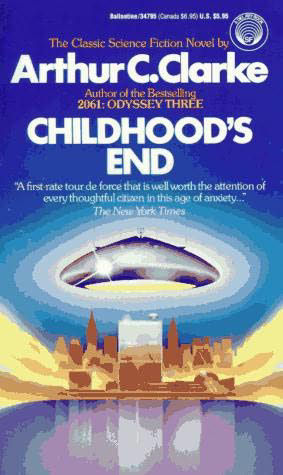
| HOME | SOLAR SYSTEM | CONSTELLATIONS |
|---|
Sir Arthur Charles ClarkeMarch 24, 2008 |

| HOME | SOLAR SYSTEM | CONSTELLATIONS |
|---|
Sir Arthur Charles ClarkeMarch 24, 2008 |
For more than half a century, they held court as "The Big Three" science fiction writers of all time. Isaac Asimov, Robert Heinlein, and Arthur C. Clarke. The great Heinlein died in 1988. The genius Azimov, in 1992. Now with the death of Clarke on Wednesday, March 19, 2008, an era is over. As the title of one of his most famous works, Childhood's End, suggests, the death of Arthur C. Clarke may well mark the end of our childhood, as a species.

Ninety years ago, when Arthur C. Clarke was born, there was no Internet. There were no computers. You were lucky if you owned a primitive phone. Cars and airplanes had just been invented. Technologically, we were infants, but we were growing fast. Over the ensuing nine decades, we developed a worldwide communication system, computers that are almost Human, set foot on the Moon, and sent spacecraft billions of miles out into space. Of course we still have a lot of growing up to do, but we are infants no longer.
And Arthur C. Clarke predicted it all. As if he had a crystal ball, the technological notions in Clarke's books had a habit of becoming reality. As Isaac Asimov wrote, "Nobody has done more in the way of enlightened prediction."
It was a 1964 book by Arthur C. Clarke called Dial F for Frankenstein that caught the attention of an adolescent Tim Bernes-Lee, and inspired him to go on and create something we now call the Internet. Clarke also predicted space stations, moon landings, mother ships and landing pods, and cellular phones. When he first introduced the concept of putting communications satellites into stationary geo-synchronus orbits, he was scoffed at. Now the entire planet depends on them, and the type of orbit that holds them continuously over the same place on Earth is called a Clarke Orbit.

His most popular work will always be 2001, A Space Odyssey, immortalised in the movie by Stanley Kubrick. HAL, the super computer with the soft voice and deadly devotion to duty, the big black Monoliths sent to us by an extraordinarily advanced intelligence, and even the music have all become cultural icons. Clarke was a scientist, with degrees in Physics and Mathematics, and was meticulous about the scientific accuracy of his books, as well as the scientific legitimacy of his projections of life in the future.
On December 17, 2007, Arthur C. Clarke celebrated his 90th birthday. He knew his time was short, and he had arranged to have a sample of DNA from his hair sent into space."Some day, some super civilization may encounter this relic from the vanished species and I may exist in another time," he said. At his birthday party, two short interviews were recorded, and through the miracle of a technology he helped to create, they are included here for you to listen to. Clarke was so admired for his scientific knowledge and communication skills, he sat beside Walter Cronkite as commentator for the Apollo Moon landings. This first video clip is an hilarious anecdote Clarke likes to tell about the Apollo program. He always refused to admit whether it was true or not.
When asked about his thoughts on stricter regulation of satellite television and the Internet, Clarke had this to say: "I think it is technologically impossible for any one government to (directly) control, let alone ban, transmissions coming from Earth orbit. Some countries have banned personal satellite dish antennas, others have experimented with Internet blocking, but in the long term, people will find ingenious ways to circumvent these controls.
"No, banning is not the answer. Because we frequently suffer from the scourge of information pollution, we find it hard to imagine its even deadlier opposite – information starvation. I get very annoyed when I hear arguments – usually from those who have been educated beyond their intelligence – about the virtues of keeping happy, backwards people in ignorance. Satellite television, Internet, mobile phones, email – all these are technological responses to a deep-rooted human desire to communicate and access information. Having achieved unprecedented progress in the field of communications during the past half century, we now have to pause to think of social, cultural and intellectual implications of what we have created."
During his life Clarke wrote over 100 books, and more than 1000 short stories and essays. For his literary and scientific achievements he was knighted by Queen Elizabeth in 1998. In 1994 he was nominated for a Nobel Peace Prize. An avid underwater explorer, he worked with Jacques Cousteau on perfecting Self Contained Underwater Breathing Apparatus which became the standard SCUBA equipment now used world wide. In 1956 he moved to Ceylon (now Sri Lanka) where he opened a dive shop. He remained there for the rest of his life. His dive shop was destroyed in the 2004 tsunami.
Just before his death, Clarke finished his last book, entitled The Last Theorem, which is scheduled to be published later this year. I, for one, can hardly wait.

|
|
SOLAR SYSTEM | CONSTELLATIONS |
|
|---|